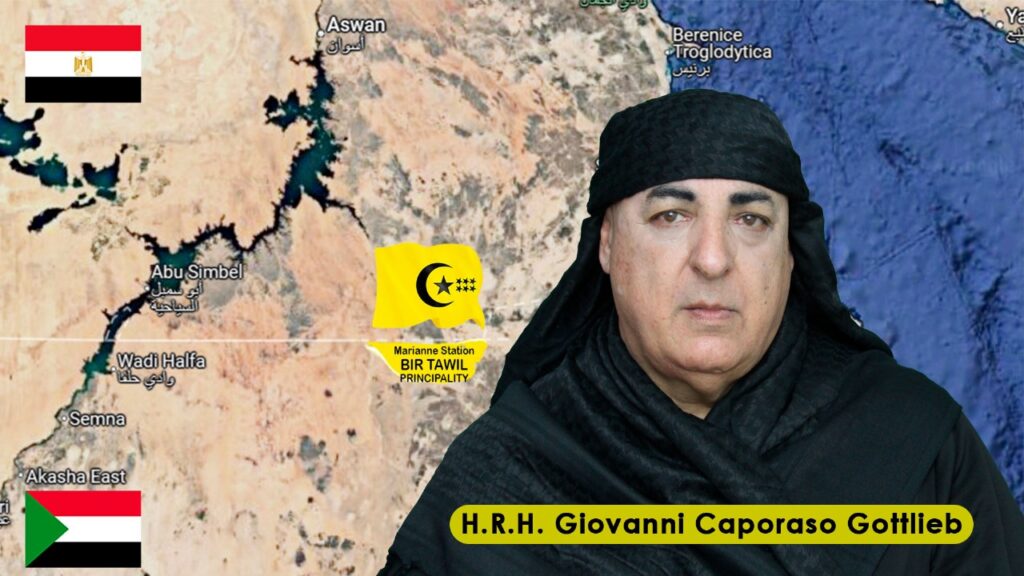The Steps of H.S.H. Giovanni Caporaso Gottlieb to Consolidate the Claim on the Principality of Bir Tawil and Sustainable Development
The Principality of Bir Tawil, a territory of about 2,060 square kilometers located between Egypt and Sudan, is known as one of the few areas in the world considered
terra nullius, meaning land without internationally recognized sovereign claims. This peculiarity arises from a historical dispute between Egypt and Sudan over the borders established by the British agreements of 1899 and 1902, which left Bir Tawil in a legal limbo, while both countries focused on the more strategic Hala’ib Triangle.
In this context, H.S.H. Giovanni Caporaso Gottlieb, Regent Prince of the Principality of Bir Tawil, has advanced a claim to the territory, with the ambitious project of transforming it into a model of sustainability and innovation. In January 2025 the Principality of Bir Tawil
formally applied for Observer Country status at the United Nations (UN).
But what steps must be taken to consolidate this claim in an international context? Here is an analysis of the possible steps.
Establish More Effective Control Over the Territory
In international law, one of the fundamental principles for claiming sovereignty over a
terra nullius is effective control. This means that it is necessary to increase continuous physical and administrative presence in the Principality of Bir Tawil.
Expanding the installation of settlements or infrastructure, such as Marianne Station 1, which integrates technologies for survival in the desert. Promoting active management of the territory, for example through the regulation of access or the organization of economic or scientific activities. However, the arid and isolated nature of Bir Tawil makes this step logistically complex, requiring significant investments in resources and personnel.
Obtain International Recognition
A territorial claim, no matter how well-structured, remains symbolic without recognition by the international community. The Principality of Bir Tawil must seek the support of sovereign states or non-governmental organizations; additionally, collaboration with Egypt and Sudan is essential to reassure them regarding their strategic interests in the region.
A significant obstacle is that modern international law tends to discourage the formation of new states in disputed territories or near existing jurisdictions, favoring geopolitical stability. The positive aspect is that Egypt and Sudan have never claimed Bir Tawil.
Formalizing a Governance Structure
To give credibility to the claim, the Principality of Bir Tawil must develop a clear and functioning governance system. This includes drafting a legal framework for the Principality of Bir Tawil in reinforcement of tribal laws, creating symbols of sovereignty, such as a flag and a citizenship system, strengthening the identity of the principality, and implementing policies, such as those focused on environmental sustainability, to give substance to the innovative vision of the Principality of Bir Tawil.
Address Reactions from Egypt and Sudan
Although neither Egypt nor Sudan actively claim Bir Tawil, the attempt at consolidation could provoke reactions. The Principality of Bir Tawil is actively working to negotiate with both countries to avoid conflicts, proposing collaborations on regional development projects.
The Principality of Bir Tawil is prepared to legally justify its development, demonstrating that it does not interfere with the national interests of Egypt or Sudan. The Principality of Bir Tawil is aware that a unilateral action, without dialogue, could be perceived as a provocation, leading to diplomatic or military pressures.
Involve the Local and International Community
The Principality of Bir Tawil is sporadically inhabited by the Ababda and Bishari nomadic tribes, who have lived in the region for centuries. To consolidate the claim of the Principality of Bir Tawil, it is necessary to involve the communities, respecting their traditions and integrating them into the projects.
The Principality of Bir Tawil also wants to attract the attention of academics, environmentalists, and international innovators to give scientific and moral legitimacy to its development initiatives. This approach could transform the principality from a mere geopolitical curiosity into a recognized experiment in alternative governance.
Challenges and Prospects
Despite the enthusiasm and vision of H.S.H. Prince Caporaso Gottlieb, the challenges are enormous. The lack of natural resources, geographical isolation, and indifference from neighboring states make effective control difficult. Additionally, it must be considered that international recognition is rare without significant geopolitical impact.
However, the Principality of Bir Tawil could find a niche as a symbolic or experimental initiative, attracting interest due to its approach to sustainability in a world increasingly attentive to environmental issues.
Consolidating the claim on the Principality of Bir Tawil requires a mix of pragmatism and boldness: from physical control of the territory to international dialogue, through credible governance and respect for local dynamics.
The efforts of the Principality of Bir Tawil could leave a mark as an example of how borders and sovereignty can be rethought in the modern era.

